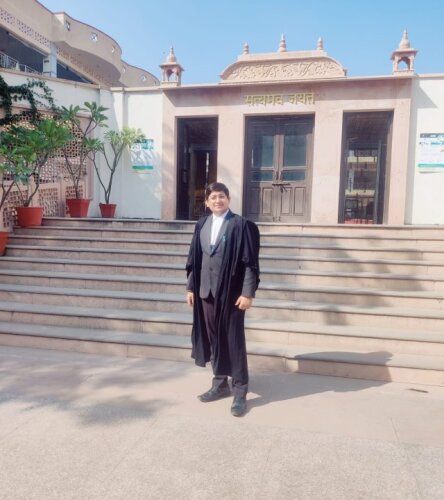Best Drug Crime Lawyers in Jaipur
Share your needs with us, get contacted by law firms.
Free. Takes 2 min.
List of the best lawyers in Jaipur, India
About Drug Crime Law in Jaipur, India
Drug-related crimes in Jaipur, as in the rest of India, are seriously prosecuted. The legal framework related to drug crimes is primarily governed by the Narcotic Drugs and Psychotropic Substances Act, 1985 (NDPS Act). Jaipur, being the capital city of the state of Rajasthan, has a robust legal and law enforcement mechanism to curb drug crimes. Offenses under the NDPS Act can range from possession and trafficking of illicit substances to manufacturing and financing drug operations. The penalties can be severe, including long-term imprisonment and hefty fines.
Why You May Need a Lawyer
Dealing with drug crime charges can be complex and overwhelming. Common situations where you might need legal assistance include:
- Being charged with possession, trafficking, or manufacturing of narcotics.
- Facing arrest and needing representation during police investigations and bail hearings.
- Appealing a conviction or seeking a reduction in sentencing.
- Understanding your rights and ensuring proper legal procedures are followed.
- Defending against falsely implicated charges or wrongful arrests.
Local Laws Overview
The key aspects of the NDPS Act relevant to drug crimes in Jaipur include:
- Possession: Simple possession of small quantities meant for personal use can lead to imprisonment for up to one year or a fine, or both.
- Trafficking: This includes the sale, transport, or distribution of drugs and carries severe penalties, including imprisonment ranging from 10 to 20 years and heavy fines.
- Manufacture: Engaging in the production of illicit drugs can result in rigorous imprisonment and substantial fines.
- Repeat Offenders: The law imposes stricter penalties for repeat drug offenders.
- Bail: Obtaining bail for drug offenses under the NDPS Act is particularly challenging, especially for serious charges such as trafficking.
Frequently Asked Questions
1. What should I do if I am arrested on a drug charge in Jaipur?
Immediately seek legal representation. Do not answer any questions or make statements without a lawyer present. Inform a trusted family member or friend to arrange legal assistance.
2. What are the possible penalties for a first-time drug offense?
Penalties vary depending on the type and quantity of drug involved. First-time offenders may face imprisonment, fines, or both. Lesser offenses can result in up to one year of imprisonment, while more severe crimes like trafficking entail much harsher penalties.
3. Can I get bail for a drug offense?
Obtaining bail for drug-related charges under the NDPS Act can be difficult, especially for serious charges. A lawyer can help navigate the legal system and improve your chances.
4. What is the definition of ‘small quantity’ for drug possession?
The NDPS Act specifies quantities for different substances. For example, possession of up to 1 gram of heroin or 100 grams of opium is considered a small quantity.
5. What constitutes drug trafficking under Indian law?
Trafficking encompasses various activities including the sale, transportation, and distribution of illegal drugs. Intent to distribute is a key element considered in trafficking charges.
6. How can a lawyer help in drug crime cases?
A lawyer can provide critical legal advice, represent you in court, negotiate bail, and work on your defense strategy. They help ensure your rights are protected throughout the legal process.
7. Are there provisions for rehabilitation for drug offenders?
Yes, the NDPS Act includes provisions for the treatment and rehabilitation of addiction. Courts may direct offenders to undergo rehab programs as part of their sentence.
8. Can I be charged with a drug crime without physical possession of drugs?
Yes, under the NDPS Act, individuals can be charged for involvement in the trafficking, financing, or manufacturing of drugs without possessing physical quantities.
9. What are my rights if police search my property?
You have the right to be present during the search, to see the search warrant, and to have a record of seized items documented correctly. Legal representation is advisable to ensure rights are upheld.
10. How long does a typical drug crime case take to resolve in Jaipur?
The duration of a drug crime case can vary widely depending on the case's complexity, the court's schedule, and whether appeals are filed. It can range from several months to a few years.
Additional Resources
For those seeking more information and assistance, the following resources might be helpful:
- Rajasthan State Legal Services Authority: Provides free legal aid and resources for individuals who cannot afford legal representation.
- Anti-Narcotics Cell, Jaipur Police: The local law enforcement division focused on drug-related crimes.
- NGOs: Organizations like the Narcotics Anonymous can provide support and information regarding rehabilitation and legal advice.
Next Steps
If you need legal assistance regarding a drug crime in Jaipur, consider the following steps:
- Contact a qualified lawyer who specializes in drug crime and NDPS Act cases.
- Gather all relevant information and documents related to your case.
- Understand your rights and the charges against you.
- Follow your lawyer's advice and attend all court hearings and legal appointments.
- Explore rehabilitation and treatment options if you are dealing with substance addiction.
Seeking professional legal advice is crucial to ensuring a fair trial and the best possible outcome in the event of a drug crime charge. Don't delay in contacting a legal expert to guide you through the complexities of drug crime law.
Lawzana helps you find the best lawyers and law firms in Jaipur through a curated and pre-screened list of qualified legal professionals. Our platform offers rankings and detailed profiles of attorneys and law firms, allowing you to compare based on practice areas, including Drug Crime, experience, and client feedback.
Each profile includes a description of the firm's areas of practice, client reviews, team members and partners, year of establishment, spoken languages, office locations, contact information, social media presence, and any published articles or resources. Most firms on our platform speak English and are experienced in both local and international legal matters.
Get a quote from top-rated law firms in Jaipur, India — quickly, securely, and without unnecessary hassle.
Disclaimer:
The information provided on this page is for general informational purposes only and does not constitute legal advice. While we strive to ensure the accuracy and relevance of the content, legal information may change over time, and interpretations of the law can vary. You should always consult with a qualified legal professional for advice specific to your situation.
We disclaim all liability for actions taken or not taken based on the content of this page. If you believe any information is incorrect or outdated, please contact us, and we will review and update it where appropriate.














